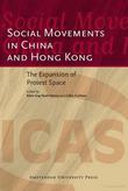Explore

Social Movements in China and Hong Kong
Khun Eng Kuah and Gilles Guiheux
2009
0 Ungluers have
Faved this Work
Login to Fave
The starting point of this book is the acknowledgement that on one side Chinese individuals, freer from the constraints of the State, have to rely on their own efforts for their well-being and, on the other side, in some circumstances, they gather together to defend their interests. The individualisation of society goes hand in hand with the collective movements that emerged as a result of individual wants. There are not only internal factors leading to the emergence of collective forms of action, but also external ones and that's why the editors have chosen to encompass Hong Kong in their study. The authors argue that protest actions and movement taking place in the Mainland and Hong Kong have enabled both societies to expand their protest spaces. At a theoretical level, these developments lead us to reconceputalise citizenship as practised rather than as given.
Het uitgangspunt van dit boek is dat Chinese individuen van hun eigen inzet uit moeten kunnen gaan, ongeacht de beperkingen die hen door de staat worden opgelegd. Om hun belangen beter te kunnen verdedigen sluiten sommige individuen zich aan bij sociale bewegingen, die tot sociale protesten kunnen leiden.
This book is included in DOAB.
Why read this book? Have your say.
You must be logged in to comment.
Rights Information
Are you the author or publisher of this work? If so, you can claim it as yours by registering as an Unglue.it rights holder.Downloads
This work has been downloaded 548 times via unglue.it ebook links.
- 97 - pdf (CC BY-NC) at OAPEN Library.
Keywords
- Asian Studies
- Culture and instituten
- Culture and institutions
- Social change
- Society & culture: general
- Society & Social Sciences
- Sociologie
- Sociology
- Sociology & anthropology
- thema EDItEUR::J Society and Social Sciences::JB Society and culture: general
- thema EDItEUR::J Society and Social Sciences::JH Sociology and anthropology
Links
DOI: 10.5117/9789089641311Editions

